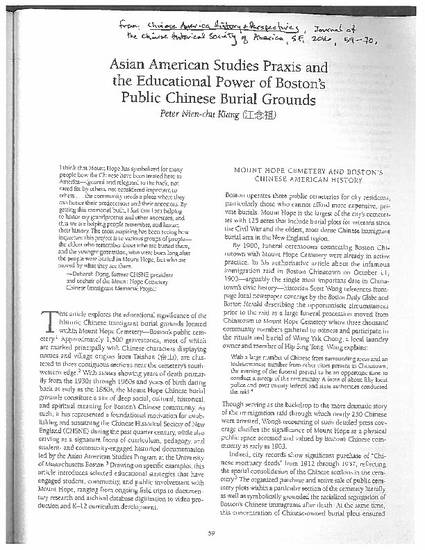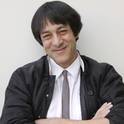
Article
pk mt hope CHSA 2016.pdf
Chinese America: History and Perspectives – the Journal of the Chinese Historical Society of America
(2016)
Abstract
Asian American Studies Praxis and the Educational Power of Boston’s Public Chinese Burial Grounds
This article explores the educational significance of the historic Chinese immigrant burial grounds located within Mount Hope Cemetery – the public cemetery of the City of Boston. Approximately 1500 gravestones, most of which are marked principally with Chinese characters displaying names and village origins (predominantly males from Taishan), are clustered in three notable, contiguous, sections of one corner of the cemetery. With years of death ranging mainly from the 1930s through 1960s and years of birth reaching as early as the 1870s, the Mt. Hope Chinese burial grounds represent a site of deep social, cultural, historical, and spiritual meaning for Boston’s Chinese community. As such, it has served as a foundational motivation for establishing and sustaining the Chinese Historical Society of New England (CHSNE) during the past 20+ years while also serving as a signature focus of curriculum, pedagogy, and student/community-engaged historical documentation led by the Asian American Studies Program at the University of Massachusetts Boston. Drawing on specific examples, this article describes a variety of innovative educational strategies to increase student, community, and public awareness about Mt. Hope, ranging from field trips to documentary research to video production to K-12 curriculum development to archival database digitization. The article includes photographs and links to additional resources.
Keywords
- chinese burial grounds,
- asian american studies,
- pedagogy,
- chinese american history,
- boston chinatown
Disciplines
Publication Date
Fall 2016
Citation Information
Peter N Kiang. "pk mt hope CHSA 2016.pdf" Chinese America: History and Perspectives – the Journal of the Chinese Historical Society of America (2016) p. 59 - 70 Available at: http://works.bepress.com/peter_kiang/9/
